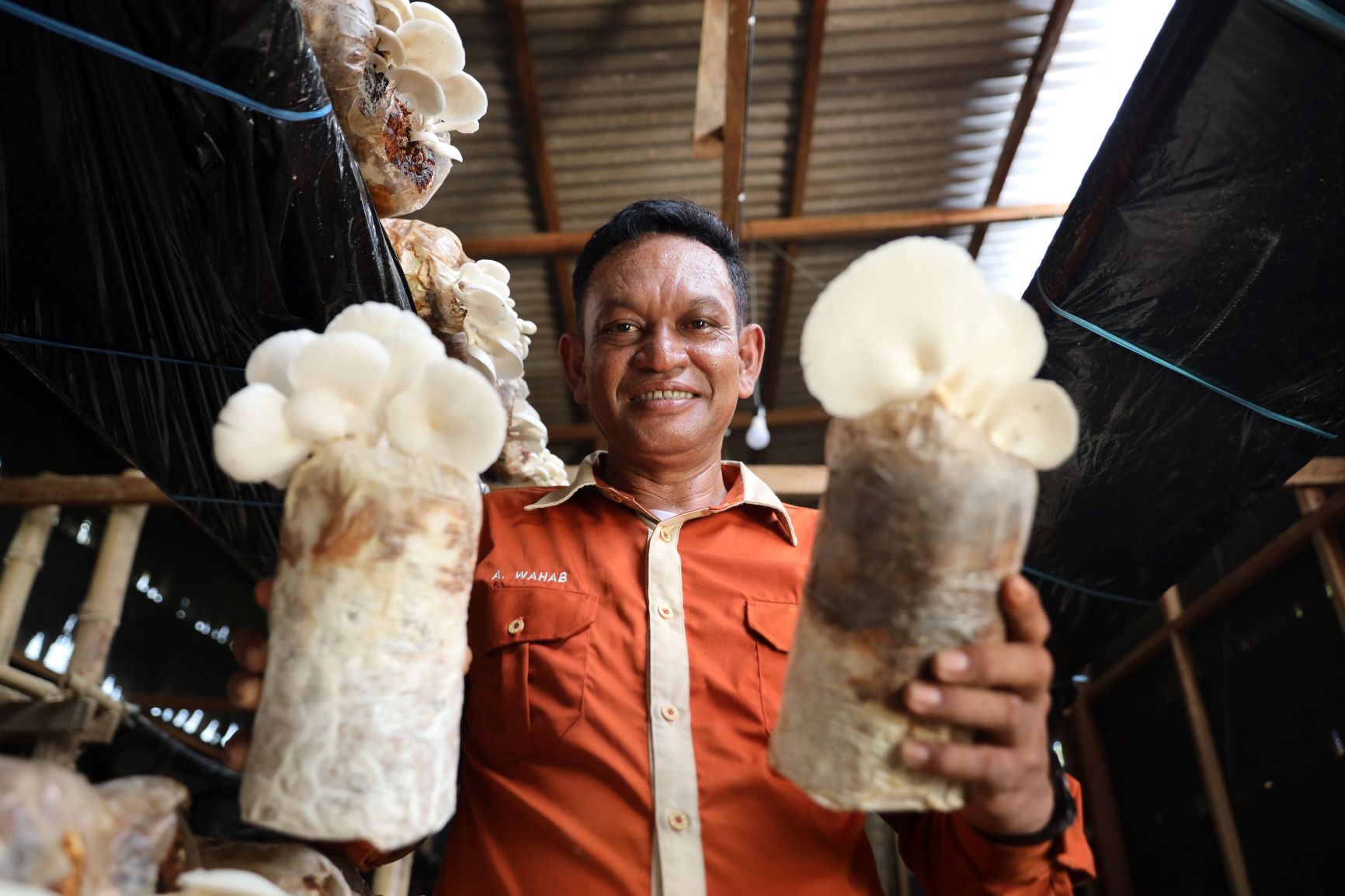04
Dec

Penajam Paser Utara– One of the subsidiaries of PT Pertamina Hulu Indonesia (PHI), namely PT Pertamina Hulu Kalimantan Timur Daerah Operasi Bagian Selatan (PHKT-DOBS), continues to support regional government programs in the Company operational area in East Kalimantan. Through the Semur Cendawan Program (Semai Jamur dengan Cerdas dan Berwawasan Pangan) in Waru Village, PHKT is supporting Penajam Paser Utara Regency (PPU) towards food independence.
The Cendawan Semur Program is PHKT-DOBS's flagship CSR program, started at the beginning of 2022. The program commenced with a Focus Group Discussion involving the Kontak Tani Nelayan Andalan (KTNA) of PPU Regency. During the discussion, there was an aspiration from one of the members who saw the potential for developing mushroom cultivation in the Penajam Paser Utara.
The General Manager of Zona 10 Regional 3 Kalimantan, Avep Disasmita, explained that the potential for mushroom cultivation developed in the Semur Cendawan Program could be a solution to meet food needs and become a source of additional income for farmers to improve welfare.
"We are committed to continuing to develop mushroom farmers in Waru Village by increasing the quality and quantity of mushroom harvests so that they will become independent and prosperous communities," added Avep Disasmita.
Avep Disasmita considers this program an alternative solution to tackle challenges in the economic, social, and environmental fields within PPU Regency, a candidate for the state capital or IKN. Consequently, Avep emphasizes the importance of collaboration with all stakeholders, including the Food Security Service, SKK Migas Kalsul, and the beneficiaries. This collaborative effort aims to create shared value through the program.
Dharma Saputra, in his role as Head of Communication, Relations, & CID (CRC) at PHKT Zone 10, elaborated that the formulation of this program received backing from the findings of the Social Baseline Study Social Mapping, conducted at four-year intervals. This approach ensured the program's alignment with specific needs while simultaneously addressing existing issues within the region.
According to Dharma, cultivating mushrooms enables people to farm more efficiently as it does not necessitate vast expanses of land. Apart from that, mushroom cultivation can be carried out with the integration of horticultural crops so that they add value.
"Apart from being a solution to land needs and climatic conditions that do not support agricultural businesses, mushroom cultivation also produces beneficial impacts on the environment because there is the absorption of sawdust waste used as the main ingredient for making herbal planting media or baglog," he explained.
Wahab also mentioned that the Chairman of the Kelompok Bintang Jamur under PHKT explained how mushroom cultivation solves the problem of sawdust waste in Waru Village.
Wahab also revealed that since the initiation of the Semur Cendawan program, the local community's perception of the ongoing issue of land conversion has shifted. This change has occurred through their proactive engagement in utilizing the remaining land via intensified activities.
The mushroom cultivation learning center in Waru Village, serving as the site for the Semur Cendawan Program, has garnered complete endorsement from the regional government. This backing was solidified through the issuance of an official statement letter by the North Penajam Paser Regency Food Security Service, designating it as a center for mushroom cultivation learning and education.
Meanwhile, PHI Communication Relations & CID Manager Dony Indrawan stated that PHI and its subsidiaries are committed to developing innovative and sustainable CSR programs aligned with company policies to carry out safe, compliant, and environmentally friendly operations.
"In the company's CSR programs, we encourage capacity building and independence of all fostered partners. "This is proven by continuing to carry out mentoring efforts and providing support in the form of developing moral and material capacity to the fostered partners," he said.
Dony said that in the Semur Cendawan Program, PHI chose a community development strategy, where group institutional development is the key to improving the welfare of the community of the fostered partners.
"We continue to engage in discussions and cooperation regarding the development of the Cendawan Semur program to ensure that its benefits are felt across the community, making it a program shared by all," he said.
"PHI and all its subsidiaries and affiliates are always committed to carrying out CSR programs that support community development and independence, in line with our efforts to achieve sustainable development goals (SDGs)," he concluded.
PT Pertamina Hulu East Kalimantan (PHKT) is a subsidiary of PHI that manages upstream oil and gas operations and business by Environment, Social, Governance (ESG) principles in the East Kalimantan & Attaka Working Area in East Kalimantan. PHKT, with other PHI subsidiaries and affiliates, continues to carry out various innovations and technological applications in producing safe, efficient, reliable, compliant, and environmentally friendly energy to realize #EnergiKalimantanUntukIndonesia. More information about PHI is available at https://phi.pertamina.com.

